The government should take responsibility for its mistakes
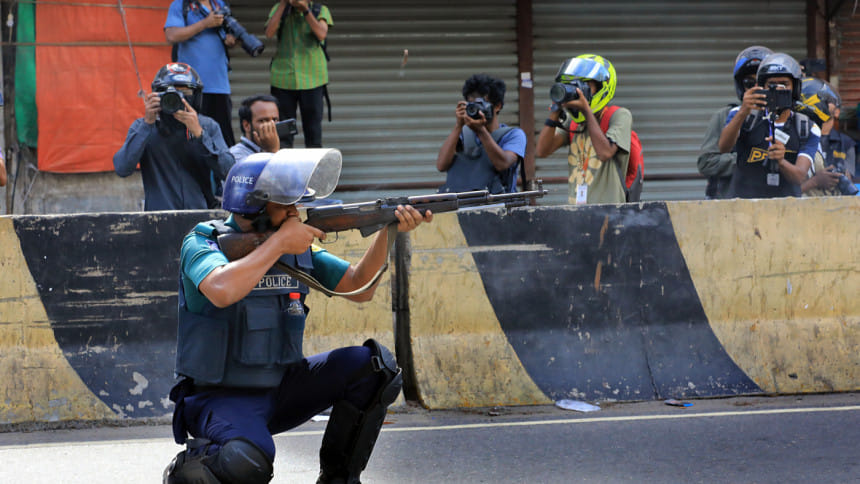
On Friday, July 19, as I was trying to return home from Dhanmondi, I was stopped at Jahangir Gate and was not allowed to pass through the cantonment. On my right, Mohakhali was on fire and gun shots had people running helter-skelter. In that situation, I, an elderly citizen, was roughly denied access through the cantonment. Annoyed, I refrained from giving names. I decided to walk towards Mohakhali. Halfway on my journey, a low flying helicopter suddenly started firing and gassing the place. Frightened, we all pressed ourselves against the side wall. Within minutes of that, a white car zoomed by, randomly spraying gunshots at pedestrians through its windows. I could barely read the words "Metropolitan Police" spelled out on the car as it flew off. So, who was firing? The police. If they fired through the left window, we surely would have been hit. Stunned, I stood there dazed. My god! My city has turned into a battle field. But who were they fighting? Where was the enemy?
There was a young lad sitting on the sidewalk, hit by splinters that barely missed his eyes. His friends were helping him. After a moment of sympathy, I moved on, when a middle-aged man stopped me saying, "Madame, I know you. Please don't go that way. Three young people were shot dead. A young lad of 14 years was killed two minutes ago by the police, who was kicking him to check whether he was alive."
The man almost broke down in tears. He said "Who are these people who have no compassion for us? Why are they shooting us?"
Will my government please explain on whose orders such horrific crimes were committed by our police? What I saw on the streets was beyond description.
On that one Friday, July 19, 66 people, that this paper could independently confirm, were killed all over the country—the highest in one day.
It was Thursday, July 18. Notun Bazar, Badda, Rampura, Banasree, and adjacent areas were some of the hotspots of violence. I live nearby. I go out every day like an observer to see if our children need help. I find them battling armed police and cadres with stones and sticks. On Thursday, they were thirsty and tired and asked for water and saline. Five people were killed, including one policeman, so said the young protesters. When I went towards Mohakhali, we found a policeman who took refuge on the rooftop of a building when hundreds of people, young and old, were guarding the place so that he could not escape. An older figure tried to calm the angry group of students and locals and requested them to let him go. A young girl shouted, "We don't want any police. They have been killing us. We won't let him go."
I left the place deeply disturbed with the knowledge that people now perceive the police as their enemy.
Police, Chhatra league and the BGB will all have to come to terms with the fact that they have children, younger brothers and sisters, who are now fighting them.
Till date, reports from various sources say that over 2,500 people have been arrested, 146 have been killed, and thousands injured. Observers say that the number of casualties may rise even further.
A student protest over a legitimate demand has been blown out of all proportions. A peaceful gathering, a demand for right to equal opportunity, a demand for reforms in a quota policy has been ruthlessly and brutally repressed—turning a small issue-specific student movement into a bizarre national crisis. The utter lack of empathy and sensitivity to the needs of our children is shocking. This catastrophe could have been avoided at many levels.
Leaders in the government could have come down from their high horses and heard the children out. Not one minister, not one neta (leader), not even a local neta, met with the children. Instead, they unleashed armed cadres into the campus, who carried out a mayhem before our very eyes and before the eyes of our government. The university administration sat back and cowardly watched the mayhem. This was betrayal. From then on, things went out of control.
The government could have solved the quota issue without involving the court. The court clearly stated that this could have been resolved through the executive powers of the government. The government wasted time while the violence continued.
It could have called a halt to the police-BGB actions while seeking to negotiate concessions. It pretended to negotiate on Thursday, July 18, while killings reached a peak on Friday, July 19. What they achieved on Sunday, July 21, should have been followed by withdrawal of all armed forces and cadres from the field and from campuses, and withdrawal of the curfew so that children could return to their schools safely. The lives of these children will never be the same again.
The government should take responsibility for its mistakes. It needs to withdraw and ban all political cadres from the campus, whether they are Chhatra League, Dal or Shibir, and immediately call back home Chhatra League and bring them under disciplinary actions. A section of them have been dehumanised.
Sharmeen Murshid is a freedom fighter
Views expressed in this article are the author's own.
Follow The Daily Star Opinion on Facebook for the latest opinions, commentaries and analyses by experts and professionals. To contribute your article or letter to The Daily Star Opinion, see our guidelines for submission.

 For all latest news, follow The Daily Star's Google News channel.
For all latest news, follow The Daily Star's Google News channel. 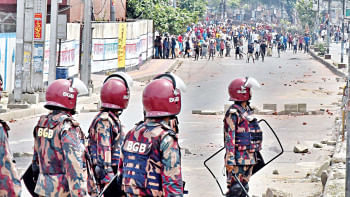
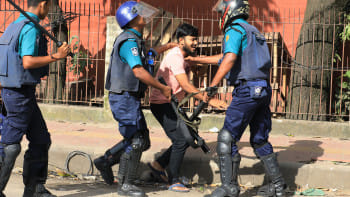




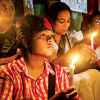
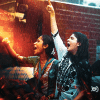




Comments